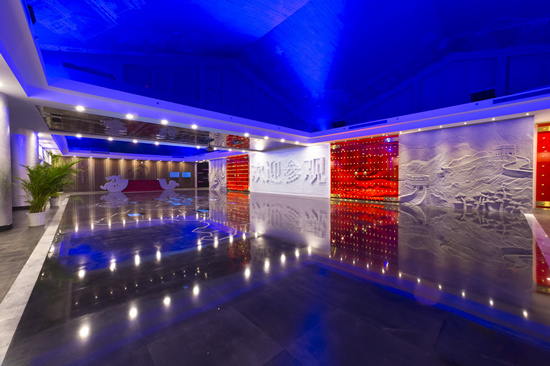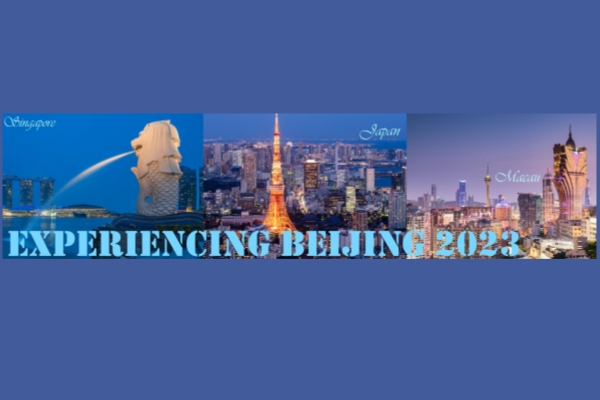Beijing releases key plan to become national cultural center
Beijing’s authorities released an important medium and long term plan -- running from 2019 to 2035 -- to advance the capital city's transition into a national cultural center, at a news conference held by the municipal information office on April 9.
It is proposed in the plan that by 2025, Beijing's status as the national cultural center will be significantly enhanced. Its citizens' cultural values and their levels of refinement and cultural awareness will be significantly improved and the city's demonstration and leading role in the creation of a modern national culture will be more prominent, officials said.
By 2035, the aim is for Beijing to have become an advanced cultural capital of socialism with Chinese characteristics in an all-round way. Its function as a national cultural center will be more profound. The plan envisages that the driving force of culture in the capital's economic and social development will be entrenched, its international influence will be significantly enhanced -- and Beijing will have evolved into a world famous historical and cultural city with confidence and diversified and inclusive charm.
At the same time, the plan puts forward expectations for 2050. Among them, that Beijing's advancement as the cultural capital of socialism with Chinese characteristics has become consolidated by then.
It will continue to be a magnet for cultural experts, preside over the publication and release of high-level literary and art works, while the cultural creativity of its people will have been fully realized.
Meanwhile, the socialist spiritual civilization and the material civilization will have been developed by then in a comprehensive and coordinated fashion, while the capital’s cultural consciousness and cultural confidence is more obvious. The plan sees Beijing becoming a world cultural symbol, promoting Chinese civilization and leading the trends of the times.
According to the plan, the construction of national cultural center will be based on the basic pattern of "four cultures" -- namely, ancient capital culture, red culture, Beijing-style culture and innovative culture.
This will be coupled within the overall framework of "one core, one city, three belts and two areas": that is, guided by the socialist core values, based on the protection of historical and cultural cities, focusing on the construction of a Grand Canal culture belt, a Great Wall culture belt and a Xishan Yongding River culture belt. This will promote the construction of demonstration areas for the public cultural service system and a leading area for cultural industry development.
The plan proposes that Beijing’s old city area is the key area for the protection of its famous historical and cultural footprint. Beijing will promote the protection and revitalization of the old city area through the world heritage application of the Beijing’s central axis and focus on creating 13 cultural essence areas.
Beijing will implement a project to improve the quality of online literature and art. It will support the creation and production of original online literature and art works and improve the quality of emerging artforms such as online literature, online movies, online dramas, online performances, online music and online animation.
In addition, Beijing will promote the transformation and development of online literature and art from low-quality to high-quality and promote a large number of excellent works leading the way in online literature and art.
At the same time, it will give full play to the special advantages of emerging communications technologies -- such as instant, fast, wide coverage and interconnections -- to provide excellent cultural products, expand the channels of literary and art transmission, improve the spread of literature and art and make online literature and art an important way to supply high-quality cultural products.
By 2035, the per capita coverage area by public cultural service facilities in Beijing will have increased to an average 0.45 square meters. By 2035, Beijing will also have full coverage of digital libraries, digital cultural centers and digital museums.
At the same time, the capital plans to be an innovative and creative city with international competitiveness. It will possess a modern cultural industry system and a cultural market system with international influence -- promoting the integration and development of culture, science and technology, finance, sports and other related industries and striving to cultivate new energy for cultural industry development.
Beijing will strive to transform itself into a city of design, film and television, performance, music and online games. It will also be a world-famous tourism city, an art trade and exhibition and convention center, so that the city can become an innovative and creative center to meet the high-quality cultural needs of its people.
At the same time, Beijing will accelerate the implementation of a "cultural business area" plan and build new cultural and leisure spaces that integrate artistic performances, interactive experiences and fashion consumption, so as to create a new cultural and commercial landmark with global popularity.
In addition, Beijing plans to build itself into a renowned tourism city that can showcase the charms of Chinese culture. Based on the profound cultural background and resource advantages of the capital, Beijing will build its own resources system, service facility system and industrial system with global influence and competitiveness.
By 2035, it is estimated that Beijing's tourism spending will account for more than 30 percent of the city's total consumption.
It is also estimated that by then, the number of inbound tourists in Beijing will reach about 10 million annually -- of which the proportion of international government, business and conference tourists will not be less than 50 percent, creating a new growth point for the economic development of the capital.
The plan also proposes to promote the internationalization of tourism public services, improve multilingual tourism guides, traffic maps, tourism application software, urban Chinese and English signs and signals. Further, it will promote multilingual menus in hotels and restaurants and realize full coverage by English voice prompts on public transport.
The plan says it is necessary to implement international tourist consultation services -- improving such things as multilingual services covering medical insurance, tourism complaints, emergency rescue and foreign currency exchange.
The plan says it is important to improve the quality of tourist toilets and ensure there are barrier-free facilities in tourist spots. Under it, Beijing will also strive to build a smart city, smart scenic spots, smart hotels and smart rural tourism, -- developing and promoting special mobile applications terminals.
The aim is to meet the needs of tourists comprehensively and provide a complete and entire range of tourism services.

 Responsibilities of the SOCAAC
Responsibilities of the SOCAAC Experiencing Beijing 2023
Experiencing Beijing 2023